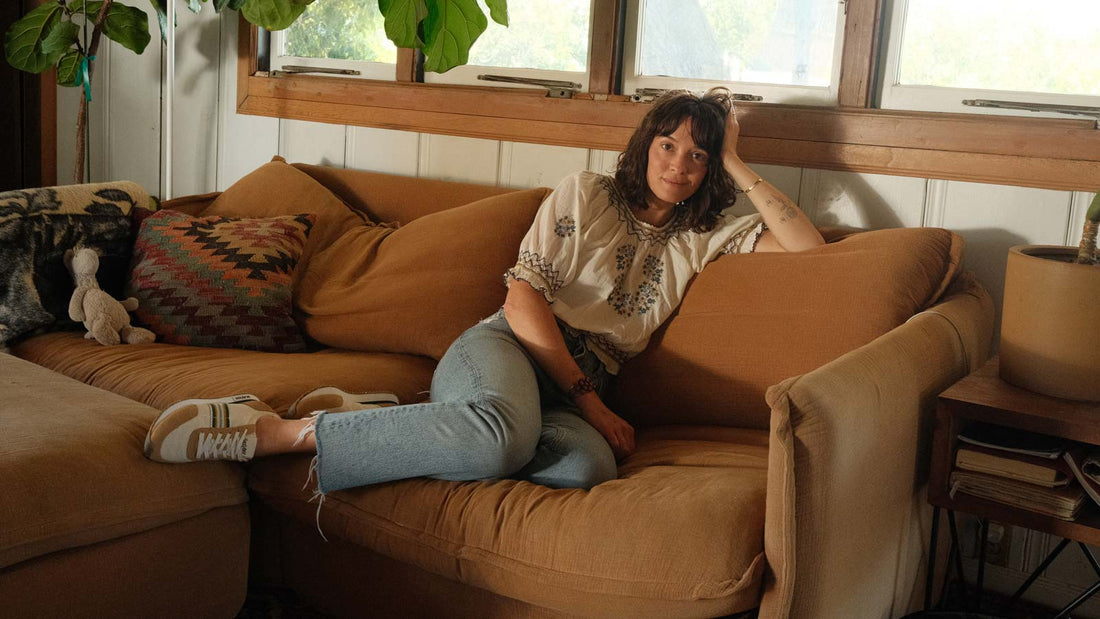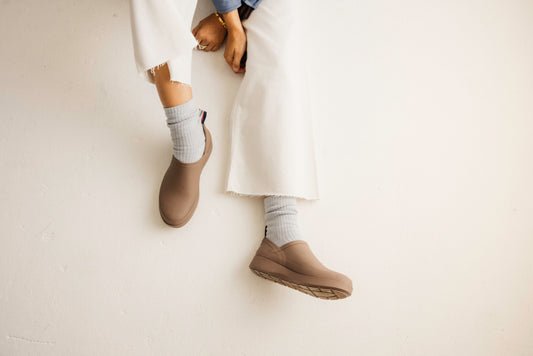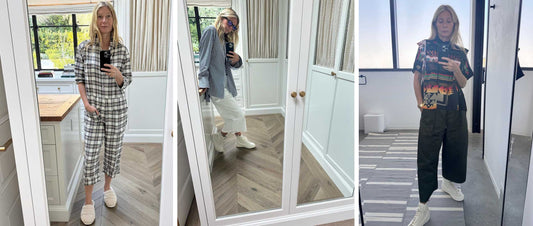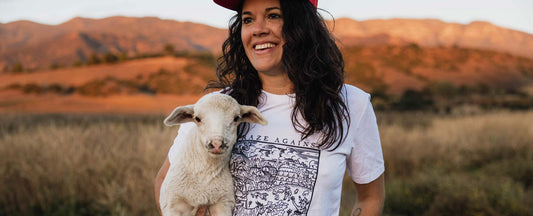Stop and picture a novelist in your mind’s eye, mustache skimming a glass of whiskey or tortoise-shell glasses perched under blunt-cut bangs. “Real writers” live in country homes and go on safari and only use incense-cedar barreled pencils, or whatever other myths we’ve learned that keep us from plain, undressed reality: most of the time, our favorite writers are just normal people who sit down and write.
Writer Erin Rose Belair does have a beautiful picture window in her home in Ojai, California. There are the vintage dresses and the kumquat trees and the stacks of dog-eared classics. But there’s also a toddler asking for sips of coconut water, baby toys scattered like dandelions across the lawn, and about two hours of nap time left for working on a rewrite of her first novel. As the cofounder of Trust and Travel, a series of writing retreats and workshops, it’s all part of a lesson Erin likes to share with the writers she mentors: mythologizing what it means to be a writer may be the very thing that keeps us from becoming one.
As told to SeaVees. Photography by Johnie Gall.

“I grew up in Minnesota in a very Norman Rockwell existence. I worked at the local Dairy Queen, swam in the lake, learned to drive a pickup truck and all of those wonderful small-town things. But I thought I wanted to be an actress, so I moved to California. There is a scene in The Fast and The Furious: Tokyo Drift where the main characters go into a nightclub and then, boom, there’s my face. I’m 18 years old, whispering into this guy’s ear, wearing these huge hoop earrings. That was pretty much the pinnacle of my acting career [laughs]—I was terrible at it.
I’d always loved writing, so I enrolled at U.C. Irvine, they have a great writing program. I had to choose between studying short stories or poetry. I didn’t understand short stories at all and they felt like the bigger mystery, so that’s the direction I took. I fell in love with fiction and ended up working for the author Ron Carlson and writing short stories for a few years before I graduated and took another ramble in life, starting a folk band with my boyfriend. I kept writing through— music, magazine articles, stuff with my sister, ghost writing a book—and eventually moved to Idaho to get my master’s degree in fiction writing at Boise State, where I worked with incredible writers including Dennis Johnson.
“It was so simple and so glorious. I had all the time in the world to write, but that also meant I let a lot of it just slip by.”
I call those years the most luxurious writing years of my life [laughs]. I was teaching writing, going to bars with writers, writing down by the river after a swim, writing in my little apartment. I’d wake up and drink coffee and feel inspired to read poetry, then maybe I’d write all afternoon before class. After I graduated, I spent a few years traveling and taking a lot in. Then I moved to the beach and I’d lay in the sand and pen poetry and just dream. I wrote the first draft of my novel there and the entire lyrical essay collection that I’m working on releasing now. It was so simple and it was so glorious. There were deadlines, of course, but I enjoyed taking my time to arrive at the page. I didn’t have a disciplined writing practice until very recently—the writing life I have now is such a wild juxtaposition to the one I had before. I had all the time in the world before, but that also meant I let a lot of it just slip by.


Now I treat writing like work. I wake up at 5am and work for an hour and a half before my son wakes up, then again when he goes down for a nap—whatever else I have going on has to stop because that’s the only time I have to write. I am in the midst of two writing projects: The Blue Years, which is a nonfiction lyrical essay that I wrote at the beach house, and my first fiction novel, which has been an absolute journey. I wrote it, then edited it, and now am in the process of a rewrite. I had sent it to my agent in New York and she wanted to see certain things happen. Then I got pregnant, and I had my son, Dean. Last October, I finally felt ready to work on it again and I’m now about halfway done—if you had told me when I was younger it would take me five years to write a novel, I would have cried, but that’s just how long the process takes sometimes.
“I think the thing I’ve learned more than anything over the last six months is the importance of asking for help.”
I think the thing I’ve learned more than anything over the last six months is the importance of asking for help. Writing a novel is the most humbling experience I’ve ever had in my life and I’m riddled with self-doubt on a daily basis. I hired a writing coach to help me work through this process—she’s part editor and part therapist, honestly, because she is able to ask the kind of questions that help me bring the answers to myself. Same goes for finding someone to help me with my son—he has an amazing nanny who comes two days a week and it gives me the space to edit, manage my business, go to pilates, whatever, so I can be fully present when I’m with him. My only advice for being a mother is to figure out what works for you and then do that because someone is going to tell you you’re doing it wrong either way. I hope becoming a mother has made me a different, better writer. That I’m able to tap into certain experiences that I wasn’t before. That I have more landscape in the sense that having him uncovered more territory of who I am.

I feel as though I’m right at the edge of what I considered for so much of my life to be my dream. That’s not to say either of my books will be wildly successful, but they could be. I always operate under the belief that success happens for someone, so why not me? What would it look like if my dream came true? The Blue Years collection would become an absolute cult classic that everyone keeps on their bedside table and gifts to their friend with a broken heart. My novel would be a smashing hit that becomes a huge commercial success. But whether or not those things happen, I will always go back to writing. It’s the only dream I’ve ever had and the only thing I’ve ever been very good at. I once had a writing teacher stand in front of a room full of writers say, ‘Only one of you will actually become a writer. And the only difference between that person and the rest of you is that the rest of you will just stop writing.’ That was always my plan: to be the writer who doesn’t stop.


Teachers like that have played the most integral role in my life. I’ve never had a strong grasp on grammar or proper writing techniques, and because of that, I’ve had teachers kick me out of classrooms. One threw a book at my head. Another told me that my level of inaccuracy was an embarrassment to the level I was studying at. But most of them have been incredible, like the one who reminded me that all the things people were telling me were wrong with my writing might one day be considered my style.
“The hardest part about pursuing a dream is making yourself sit down and do it. Because once you’re doing it, you remember why you love it and it gets easier.”
Some of the most wonderful writers in the world never studied or went to school for it—the beautiful thing about writing is that you can simply read a lot and get a grasp on it. Anyone can just start writing, and most often the only thing standing in your way is yourself. It’s one of the reasons I teach now and why my business partner Jade and I started Trust and Travel — I want to be an access point for people to learn about writing in an uplifting and positive way. To be that person who shows someone at whatever age, young or old, that expressing themselves through writing can feel like the most natural and important thing they’ll ever do.

Our first Trust and Travel retreat was in Mexico in 2019 and we’ve since hosted retreats all around the world. We are headed to Sicily this spring and Morocco in the fall. We also host online workshops and share writing prompts and writing advice on our Instagram, which feels so important to be able to reach a wider audience of writers. We have so many big plans; it feels like we’re just getting started. What I want people to know is that you don’t have to be a ‘writer’ to join us—you can come as you are, human and curious. We will meet you there. There is no such thing as ‘good’ writing because when you can find your own story, your truth, and tell it honestly, then you are already doing the writing you’re meant to do. What I hope to do is just give people the tools and confidence to do it—I’m not here to grade your paper. I’m here to give you a glass of wine and be like, ‘Congratulations, you’re telling your truth’ [laughs].


My advice for anyone chasing a dream is to find a community around it, other people who you can bounce ideas off of or get advice from. And if that doesn’t exist yet, then you go be the person to invite others in. The less glamorous advice is simply to show up and do the work, and do it every single day. Create some kind of external accountability or a schedule that will put your butt in the chair every day. I’ve found that time blocking really works for me: there are chunks of time I put on my schedule where I’m going to sit down and write and nothing is going to mess with that. The hardest part about pursuing a dream is making yourself sit down and do it. Because once you’re doing it, you remember why you love it and it gets easier. I am so grateful to have found something in my life that gives me so much purpose—it’s never too late in life to find that thing.







